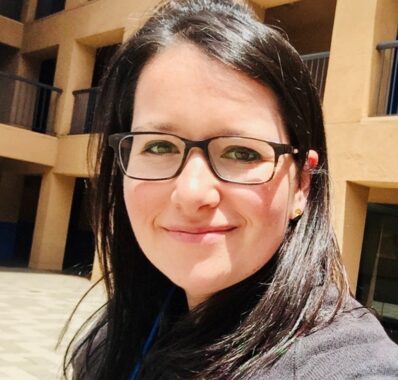Engaging and Supporting Prospective Students
How Can Institutions Draw Upon the Principles of Near-Peer Advising?
By Rebecca Wasserman and Emily Schwartz
August 3, 2020
This post originally appeared on the Ithaka S+R blog.
Reading Time: 6 minutes
The COVID-19 pandemic has upended the typical college admissions experience. At the same time, the murders of George Floyd, Breonna Taylor, Ahmaud Arbery and others have drawn heightened attention to the structural and institutional racism that exists within our educational system and the impact this has on our students who are Black, Indigenous, and people of color (BIPOC). Students preparing to enter college for the first time in Fall 2020 have made enrollment choices as the specifics of the fall semester are still coming into focus and family financial situations are in flux. Prospective students from the high school class of 2021 are preparing to apply to college in a context where junior year grades may carry different weights than in the past and traditional support systems are less accessible than ever. And, admissions offices are conducting their standard recruitment activities remotely, changing the way in which students and schools interact throughout the admissions process.
As institutions navigate these unprecedented challenges, current students—who are both experiencing the pandemic themselves and tuned into the experiences of prospective students—can help bridge the information gap between schools and prospective students. Matriculate, a not-for-profit organization that partners with colleges and universities to recruit, select, and train current undergraduates to be virtual, near-peer advisors to highly-talented, lower-income students as they make their college decisions, works with over 1,000 undergraduate advisors at 14 colleges and universities around the country to do just that. Matriculate Advising Fellows—current college students from lower-income backgrounds themselves— prepare for their role with over 50 hours of training. They practice and demonstrate proficiency in active advising techniques through a formal set of online and in-person training modules, coupled with short checks for understanding and a rigorous advising evaluation practicum. Once certified, they use video chat, text messages, and phone calls to support high school students through the college application, financial aid, and enrollment process. (Matriculate participates in CollegePoint and Ithaka S+R co-manages the American Talent Initiative (ATI). Both CollegePoint and ATI are supported by Bloomberg Philanthropies and frequently collaborate with one another.)
Through their work, Matriculate has developed a set of principles that can support institutions to utilize their current students’ experiences as the institutions work to support their most vulnerable student populations in the years to come. These principles are universal and can be applied across all types of institutions, even those with no prior infrastructure in place to engage prospective students with near-peer advisors. Below, we highlight the principles that we’ve found to be most effective in supporting lower-income prospective students.
How do you continue to build relationships with students when traditional engagement is not possible?
In recent months, institutions have had to fundamentally change the ways in which they interact with prospective students; they have had to cancel the campus visits and fly-in programs they typically rely upon to get students’ attention, while simultaneously facing likely enrollment declines in the months to come. Institutions can apply the principles of near-peer advising to expand the breadth, depth, and effectiveness of their engagements with prospective students, especially those students at the highest-risk of not enrolling. Near-peer advising leverages current students (or recent grads) to strengthen the connections between institutions and their prospective students.
There are three key components that can make a near-peer relationship particularly impactful—recency, modeling, and authenticity of relationships.
Recency: For prospective students, having someone who had just been through the admissions process themselves is relatable. Near-peer advisors can provide credible, personalized guidance from someone who was tackling a similar process just a year or two before. They can also be there for students at times of day that fall outside the traditional business hours of many more formal supports. If a high school student finishes a draft essay at 8 pm, it may be just the right time for a college student to hop online and take a look, and if they get some news on the weekend, their advisor is just a text away.
Modeling: Near-peer advisors serve both as guides in the application process as well as role models of matriculation. This approach is particularly effective because high school students can see the college student who has successfully navigated the college process as a model who “gets it.” They know not only what the process entails but also how it feels. This builds a critical degree of trust.
Authenticity: Matriculate has found that authenticity comes from recency. College students can relate to what high school students are going through because they recently applied to college themselves, lending them a level of both expertise and credibility. In addition, the program utilizes formal and informal communication, adapting the communication to the students’ expressed needs and style. Informal communication can consist of advisors reaching out to check in before or after a high school student has a long day at their afterschool job or takes a tough exam. Matriculate has found that these informal check-ins are extremely important in cultivating an authentic relationship—making it more likely that students will share the real reasons behind why they might be experiencing hurdles in their college process.
Why now?
This time is anything but normal. High school students are facing a rapidly shifting college landscape where many schools are going test-optional, creating a range of in-person and remote scenarios, and reassessing financial aid amidst changing financial circumstances. At the same time, their traditional support systems at home—school counselors and brick-and-mortar CBO centers—are pivoting to make themselves available remotely while balancing many new competing demands. By leveraging current undergraduates or recent graduates to support with virtual advising, a new supplemental support system emerges that can be available to students at the times they need it—over the summer, in the evenings, and on the weekends, when counselors may not be as reachable. This also creates an avenue for colleges to share more about their institution through 1-1 interactions that would typically have occurred at college fairs.
In addition, for the near-peer advisors themselves, outreach to prospective students can create a direct avenue for action during this time and a sense of community when many student groups cannot meet in person. Debbie—a former advisee and now a rising first-year at Harvard from Hialeah, Florida—explains how her advisor, even while remote, was able to form a personalized connection with her and be the support she needed to work through the college application and enrollment process. Debbie shares, “as a first-generation Cuban American, it honestly meant the world to me that Matriculate was consistently there for me throughout my college application process and even afterwards. My advisor was so authentic and genuine in our first meeting that I really felt like I had someone there for me that was available whenever I needed. The entire program really helps you understand that an individualized support system with first-hand experience can really give you a better understanding of the college application process as a whole.”
Where do we go from here?
Below, we’ve outlined a few ways that institutions can leverage the principles of near-peer advising to better meet the needs of prospective students.
- Understand incoming student perspectives. The way in which students are thinking about college, their concerns, and challenges are shifting quickly. If colleges assume that what was true for students in March will also be true in the fall, they are missing the reality of changing financial circumstances, comfort with travel, and current lived experience for many right now. So stay in touch, but not just through emails, posts and webinars which tend to be uni-directional. Students are much more likely to be open with their feelings and experiences in sustained conversation with a near-peer. Invest in these relationships to better understand the needs of students in this moment. Stephanie Gonzalez, Associate Director of Admission for Diversity Recruitment at Williams College shares, “for the past several years, we have offered a select group of prospective students the chance to connect with current students through a virtual call. This increases the capacity of our team to reach high-achieving, low-income students through a customized conversation tailored to their interests, needs and challenges. This year, as we move Windows on Williams, our fly-in program, fully online, we will continue to offer these opportunities as a way to directly engage with students.”
- When you can’t bring students to campus, bring the campus to them. Connecting prospective students directly with current students can be a compelling way to give students an authentic perspective on your institution. It can also expand institutional capacity for 1:1 conversations, which are increasingly important—the experiences of prospective students during the pandemic have not been uniform and individualized outreach is valuable. Brittany Johnson, Associate Dean of Diversity Outreach at Princeton University describes how this spring, when the admissions team at Princeton realized that they wouldn’t be able to invite admitted students to campus due to the pandemic, they needed a way to reach out to students and give them a strong connection point to the school. They turned to the best ambassadors—their current students—to hold calls with admitted students, tailored to their needs and interests. As she explains, “working with Princeton’s student advisors throughout our admitted student programming allowed us to really highlight the perspectives of undergraduate students in a nuanced way. The Matriculate near-peer model and their expertise in virtual connections added value to our programming and capacity to provide 1:1 opportunities for students to ask the questions best answered by students on our campus.”
- Build community. From admitted students days and dorm affinity groups, to move-in weekend and activities fairs, colleges have invested in structured ways in which to foster community and connection for students on campus. With many of these no longer possible in their original formats, it is critical to find new ways to increase a sense of belonging for students, especially for students of color and those that will be the first in their families to attend college. Consider giving current students an avenue to come together remotely to take action on educational access through a virtual advising program. In the midst of COVID-19, Emily, University of California-Berkeley’s 2020 Head Advising Fellow, shared, “through virtual celebrations on Slack about college acceptances and self-care challenges within our Fellowship, Matriculate has provided a sense of much-needed normalcy, pride, and community that is keeping us optimistic through tough times.”
The principles of near-peer advising can strengthen connections between institutions, current students, and prospective students
Both students and institutions will be navigating a changing admissions landscape for some time as the effects of the pandemic persist. While no one program can solve all problems, the principles of near-peer advising point the way to promising practices for engaging with prospective students. Institutions employing these principles, whether as part of an official advising program or not, can strengthen the connections between institutions, current students, and prospective students, a bond that will be even more important in the uncertain months and years to come.
For more information about Matriculate, please email info@matriculate.org.




